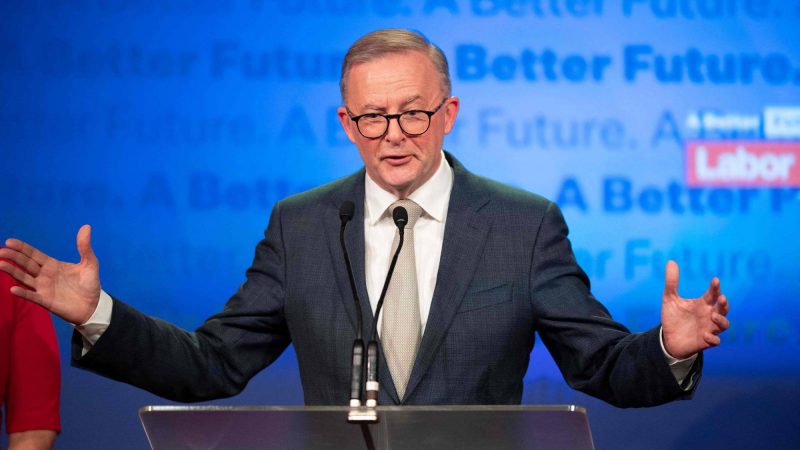Closely working with unions to fight for workers’ rights is a factor that should not be overlooked when seeking to explain the success of the Australian Labor Party.

Tony Burke is the president of the Confederation of Shipbuilding and Engineering Unions and chair of the Campaign For Trade Union Freedom
There is much the UK Labour Party can learn from the Australian Labor Party on how to boot out a right-wing government who deliberately creates division and mistrust and who the electorate have had enough of.
Mobilising workers, working with trade unions, having clear policies on jobs, employment security, the cost of living crisis, manufacturing as well as on equalities and fairness and climate change issues worked in the Australian election and such an approach can work here in the UK too.
Closely working with unions to fight for workers’ rights is a factor that should not be overlooked when seeking to explain the success of the Australian Labor Party.
Australian unions have welcomed the General Election result which saw the right wing government of Scott Morrison dumped by the electorate after nine years in power.
Morrison’s government courted right wing populism and dabbled with climate change denial, homophobia and pursued divisive policies throughout their time in office. They had mounted attacks on immigrants, attacked employment rights and attempted to wipe out trade unions.
The President of the Australian Manufacturing Workers Union Andrew Dettmar said: “Australian unions worked hard for a Labor victory. The Australian Council Of Trade Unions campaigned strongly on wages and workers’ rights. We also strongly supported the Labor call for an anti-corruption commission. Morrison had positioned himself as a fake champion of workers, but when it came to wages all he could offer was a reference to the ineffective ‘umpire’, the Fair Work Commission, while Anthony Albanese fully supported an increase to the minimum wage equal to inflation, currently running at over 5%.”
Dettmar went on to say: “The AMWU campaigned strongly around reviving Australia’s flagging manufacturing sector, which has been hit by a succession of plant closures, free trade agreements & under-investment in new plant & equipment, accompanied by a Government which has been indifferent at best and at times overtly hostile to manufacturing. After all it was during the nine years of this conservative Government that Australia’s car industry was closed down.
“The ‘Support Aussie Made’ AMWU campaign sought and received pledges from all Labor MPs and candidates to support a strong investment strategy in manufacturing, including commitment to changes to Government procurement. Over the six weeks of the campaign AMWU rank & file activists were campaigning in targeted marginal electorates, phone banking and doing community and workplace activities to get the vote out for Labor.”
ACTU Secretary Sally McManus said: “Working people have formed the backbone of a historic national campaign this election. This is a rejection of a government which refused to act to protect the interests of working people. Working people have passed judgement on the refusal of the Morrison Government to take action on real wage cuts, insecure work and rising cost of living which working people have struggled through for years under this Government.
“Workers rejected a Government which refused to support a $1 per hour increase for the lowest paid workers in our country, and kept caps in place which denied real wage rises to their own employees. This is a victory for trade unionists who stood up against a Government that refused to stand up for them.”
At the time of writing the current predictions are that Labor will probably form a majority government. The new political environment also includes a number of successful independent ‘Teal’ (their campaign colours) candidates defeating the Liberal Party in city electorates, as well as at least 3 Greens.
The ‘Teals’ campaigned on climate change and equality for women in Liberal strongholds taking the seat of high profile Liberal deputy leader Josh Frydenberg and Tim Wilson an industry and energy minister who lost his seat to former news broadcaster Zoe Daniels, complaining he was targeted “an unholy alliance” of Labor, Greens, Teals and others.
During the election Albanese backed the call from the ACTU to increase the minimum wage by 5.5% to help 180,000 workers on the minimum wage and 2.6 million workers whose wages are covered by 121 national pay awards. Albanese singled out the trade union movement for their support for him and the Labor Party.
Working closely with trade unions reaps many rewards. The Labour Party should take note.
To reach hundreds of thousands of new readers we need to grow our donor base substantially.
That's why in 2024, we are seeking to generate 150 additional regular donors to support Left Foot Forward's work.
We still need another 117 people to donate to hit the target. You can help. Donate today.



